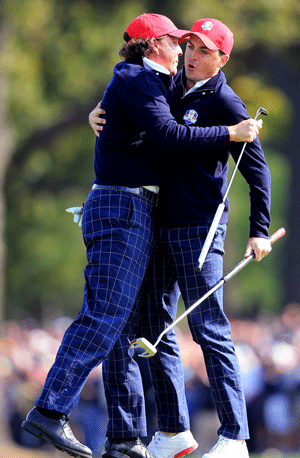The Loop
Weekend Tip: How to Be a Painless Partner
*By Roger Schiffman
Managing Editor
Golf Digest
Twitter @RogerSchiffman*

If you're not watching the Ryder Cup this weekend, you must not like golf. It just doesn't get any more exciting than this. Also, you can learn a lot about fourball (better ball) strategy by watching the matches. This is the format that most golfers play in their weekend groups, and viewing the action reminded me of a column that Golf Digest Professional Advisor and noted sport psychologist Bob Rotella wrote way back in 1988. "Two things can happen when you play as a team," wrote Dr. Bob. "You take pressure off yourself because you've got a partner. Or you put pressure on yourself because you don't want to let your partner down." The principles he talked about then still apply today. Here are three key points you can use in your partners game this weekend:
1. Share a common objective. It might be simply to have a good time and enjoy each other's company. It might be to win. Whatever the objective, it needs to be the same for both. Discuss it and agree on it.
2. Set ground rules for communication on the course. Some teams talk a lot. Some don't. Some give advice. Some don't. But good teams know the limits before they start. What they avoid at all costs is the kind of "advice" that really isn't advice at all, but rather a sign that you've lost confidence in your partner. For example, during a recent better-ball match, my partner and I were 2 down with two holes to go. One of the players had a flip wedge to the 17th green, fronted by a small creek, to par or possibly birdie the hole and close us out. As he addressed the ball, his partner said, "Make sure to get it there." Not surprisingly, he dumped it in the creek; we went on to win in sudden death. That's the kind of advice that's better not given. It says to your partner, "I've lost confidence in you." It
puts doubts in his mind. If you feel you need to point out a hidden hazard or problem, do it early, before the shot and certainly not after your partner has begun his preshot routine.
3. Make no apologies. How often have you seen one partner become the "I'm sorry" guy on a team? His partner is "the horse." He's "the load." And his apologies continue nonstop for the duration of the match. That helps no one. Nor will it help to have the other partner feeling like the martyr all day. Forget that stuff. Make it clear to your partner that you know he's doing his best, that you'll be doing your best, and that no matter what happens, there's no need for breast-beating--or blame. If you have a bad hole, remember to be as good a friend to yourself as you are to your partner when he's struggling.